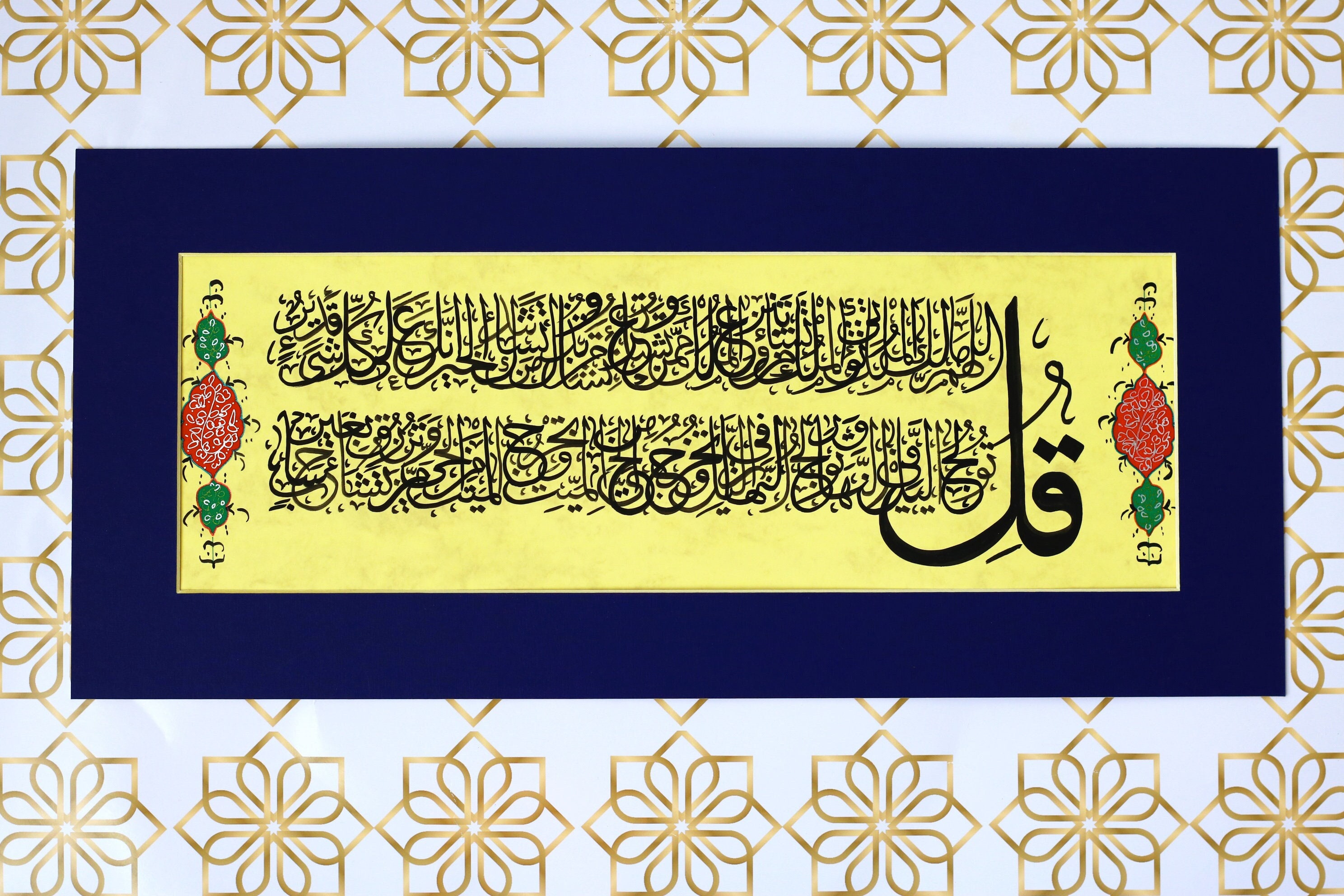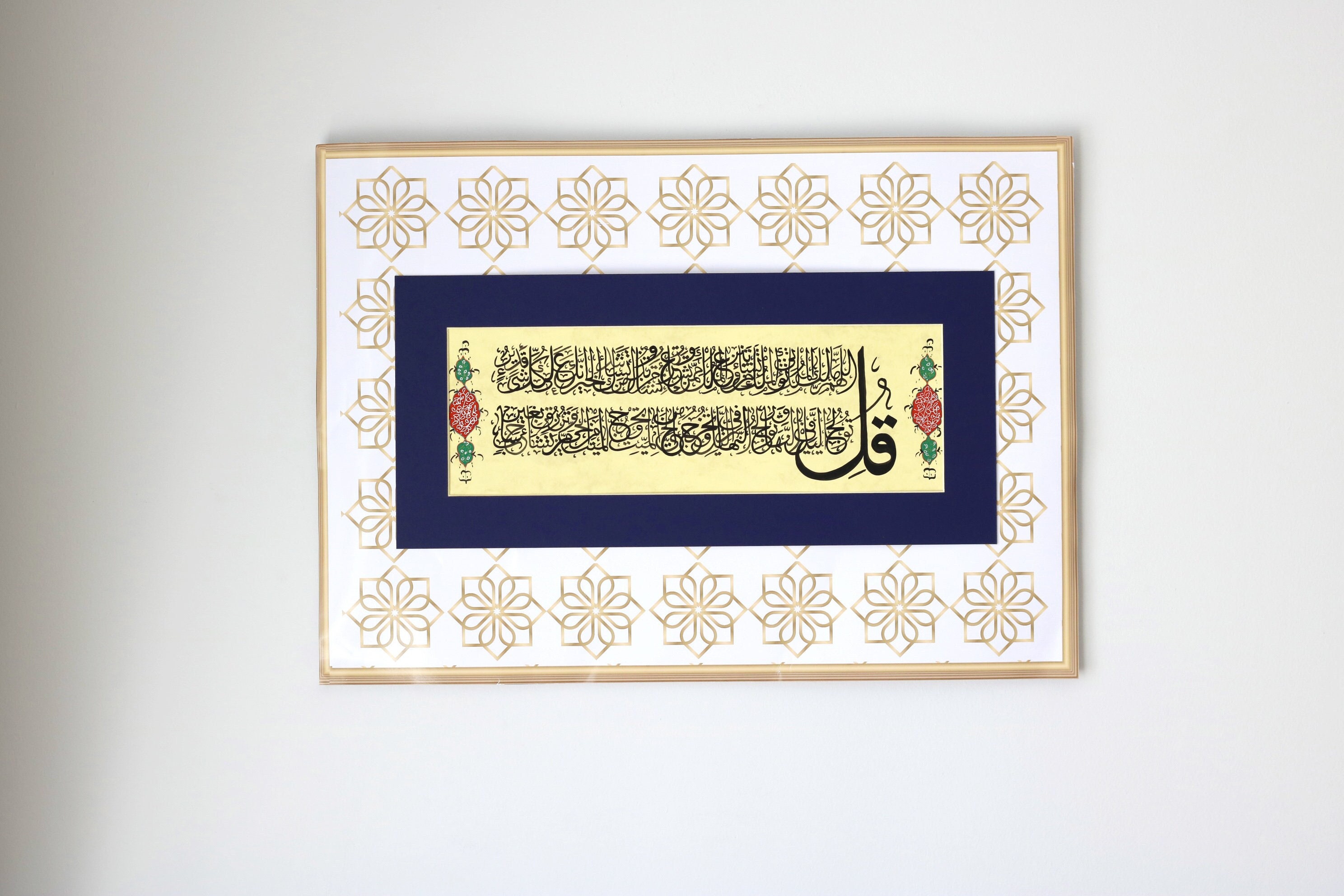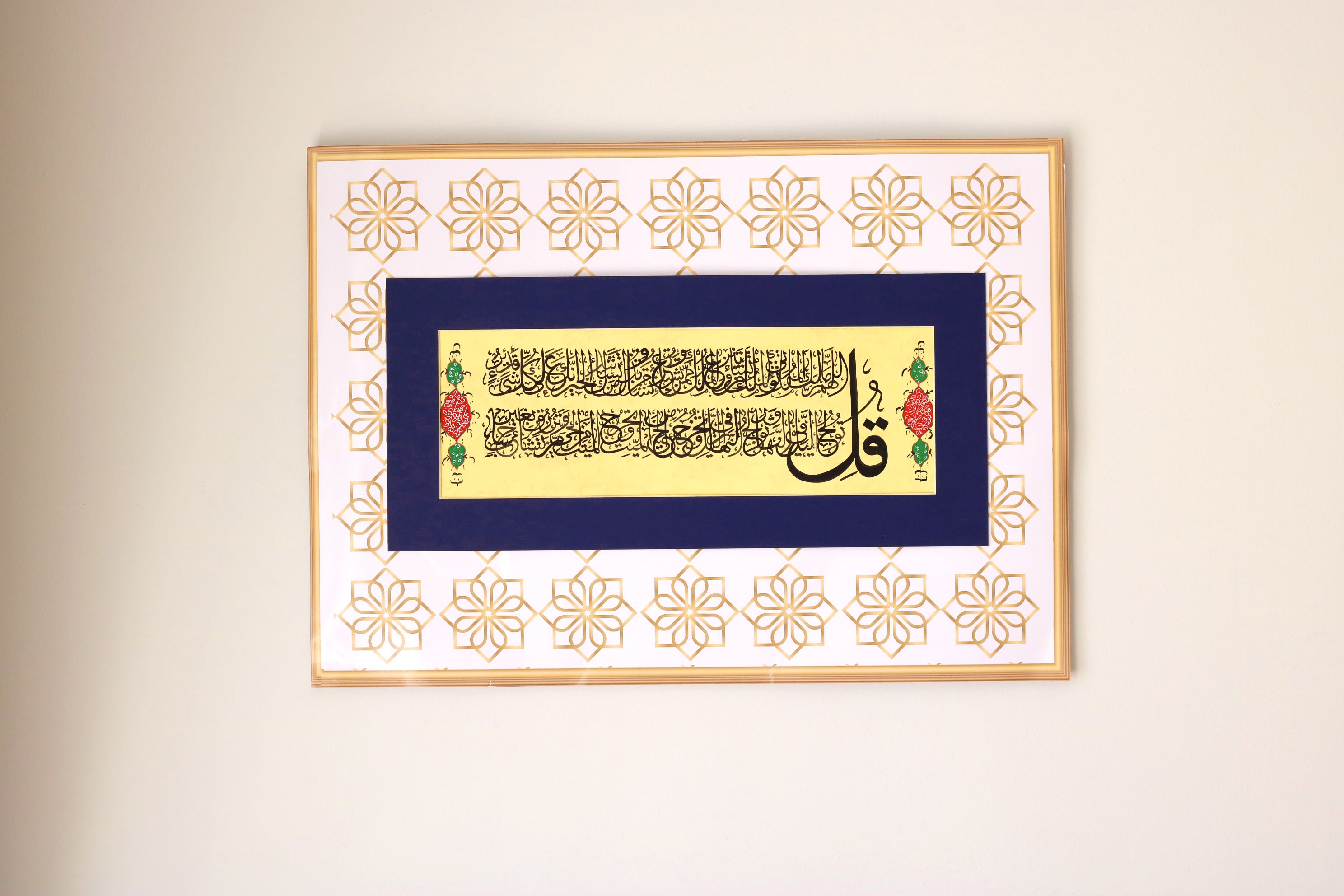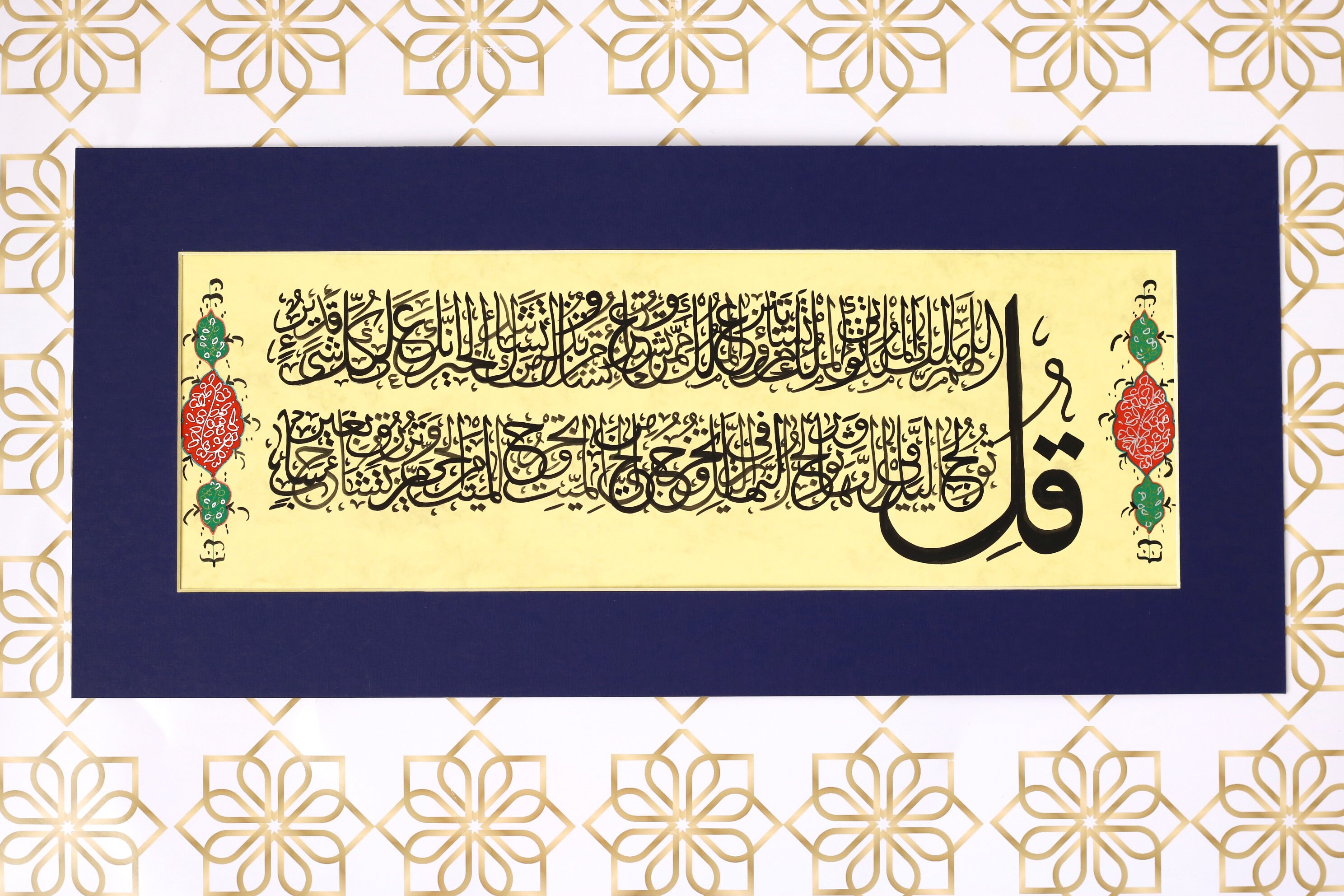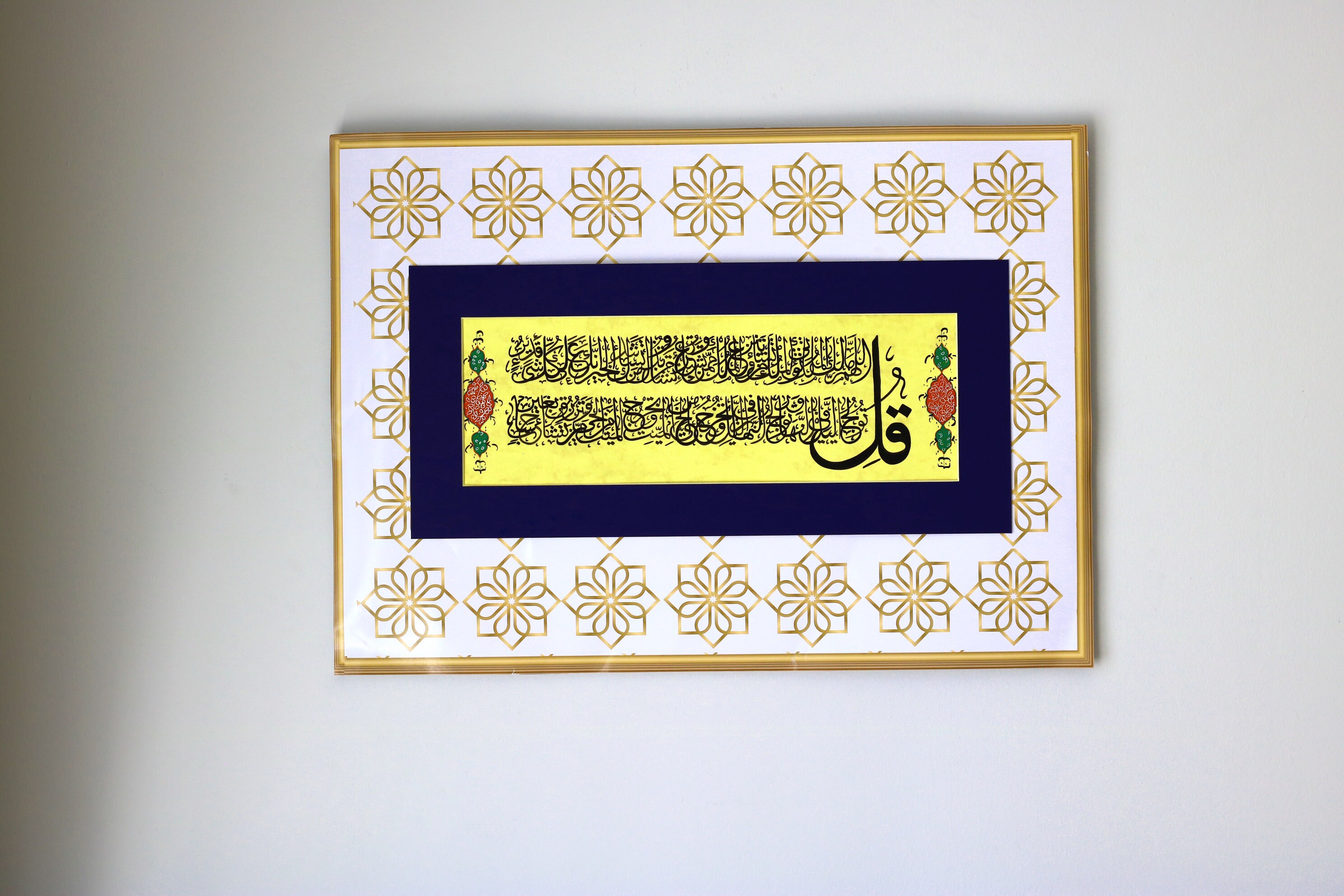Original Handmade Arabic Islamic Calligraphy Art Handmade Islamic Gift Islamic Arabic Calligraphy Surah 3 Ali 'Imran, Ayat 26-27 A6 010020
$209.00
Original Handmade Islamic Calligraphy Wall Art Handmade Islamic Decor Gift Islamic Gift Arabic Calligraphy Ramadan Gift Hand Painting Islamic Wall Décor Surah 3 Ali 'Imran, Ayat 26-27
Surah 3 Ali 'Imran, Ayat 26-27
بِسْمِ اللهِ الرَّحْمَنِ الرَّحِيمِ
قُلِ اللّٰهُمَّ مٰلِكَ الۡمُلۡكِ تُؤۡتِى الۡمُلۡكَ مَنۡ تَشَآءُ وَتَنۡزِعُ الۡمُلۡكَ مِمَّنۡ تَشَآءُ وَتُعِزُّ مَنۡ
تَشَآءُ وَتُذِلُّ مَنۡ تَشَآءُ ؕ بِيَدِكَ الۡخَيۡرُؕ اِنَّكَ عَلٰى كُلِّ شَىۡءٍ قَدِيۡرٌ ﴿3:26﴾ تُوۡلِجُ الَّيۡلَ فِ
النَّهَارِ وَتُوۡلِجُ النَّهَارَ فِى الَّيۡلِ وَتُخۡرِجُ الۡحَـىَّ مِنَ الۡمَيِّتِ وَتُخۡرِجُ الۡمَيِّتَ مِنَ الۡحَـىِّ
(3:27) وَتَرۡزُقُ مَنۡ تَشَآءُ بِغَيۡرِ حِسَابٍ
In the name of Allah (SWT), the Beneficent, the Merciful.
(3:26) Say: 'O Allah (SWT), Lord of all dominion! You give dominion to whom You will, and take away dominion from whom You will, and You exalt whom You will, and abase whom You will. In Your Hand is all good. Surely You are All-Power-ful. (3:27) You cause the night to pass into the day and the day to pass into the night. You bring forth the living out of the dead, and You bring the dead out of the living, and You give sustenance to whom You will beyond all reckoning.
Introduction: Aal-e-`Imran
تعارف سورة آل عمران
...
(Revealed after Hijrah)
Connection with the Preceding Chapter
This chapter has a twofold connection with the preceding chapter, Al-Baqarah, i.e. (1) there is a link between the whole chapter, Al-e-‘Imran and the whole chapter, Al-Baqarah, and (2) there is a link between the concluding portion of Al-Baqarah and the opening verses of Al-e-‘Imran. In fact, the order in the Quran is of two kinds: either the topic with which one chapter is concluded is continued in the following chapter, or the subject matter of the whole preceding chapter is dealt with in the next. This twofold connection exists between the Surahs—Al-Baqarah and Al-e-‘Imran.
The connection of the whole subject matter of Al-e-‘Imran with that of Al-Baqarah mainly consists in a description of the causes that led to the transfer of prophethood from the Mosaic to the Islamic dispensation. This was the main theme of Al-Baqarah, and in explanation the degenerate condition of the Jews was dealt with at some length in that Surah. But in Al-Baqarah, little light was shed on Christianity, which constitutes the culmination of the Mosaic dispensation. This omission could have given rise to doubts in the minds of some people that though Judaism which constituted the beginning of the Mosaic dispensation had become corrupt, its culmination, the Christian Faith, was still pure; and hence, there was no necessity to introduce and establish a new religion—Islam. To remove this seemingly legitimate doubt, the hollowness of the current Christian doctrines has been fully exposed in
Al-e-‘Imran. But as the Christian faith seeks to base its superiority as much on the nobility of its detailed practical teaching as on the excellence of its tenets and doctrines, so after Al-e-‘Imran this subject has been dealt with in chapter An-Nisa’ to which reference will be made at its proper place. Anyhow, the falsity of the Christian doctrines having been established in Al-e-‘Imran, the chapter proceeds to show that, as the Christian faith which had reformed and regenerated Judaism had itself become corrupt and degenerate, it could not prove a bar in the way of the introduction of a new and better dispensation. On the contrary, it constituted a strong testimony to the need for the introduction of a new Law. Consequently, the Divine attributes of "Living" and "Self-Subsisting and All-Sustaining" in the very beginning of Al-e-‘Imran are intended to repudiate Christian doctrines.
The second kind of connection viz. that of the concluding portion of Al-Baqarah with the opening portion of Al-e-‘Imran is apparent from the fact that the former Surah had concluded with some prayers in which prayer for national reformation and for the triumph of Islam over its enemies formed the main subject; and by placing the Divine attributes of "Living" and "Self-Subsisting and All-Sustaining" in the beginning of Al-e-‘Imran, Muslims have been assured that God will certainly come to their aid and that by His help alone can success be achieved, because He being "Living" and "Self-Subsisting and All-Sustaining", His power knows no weakening. Similarly, verse 5 of the present chapter, which purports to say that a grievous punishment is in store for those who have rejected the signs of God and that God possesses the power to take revenge, points to the acceptance of the prayer embodied in the concluding words of the last chapter, i.e. So help us against the disbelieving people.
Title and Date of Revelation
This Surah is known by several names in the Hadith. Like Al-Baqarah, it is also known by the name Az-Zahra’(the Bright One) which is indicative of the strong similarity existing between the themes of the two Surahs and their subject matter. The chapter is also known by the names Al-Aman (Peace), Al-Kanz (the Treasure), Al-Mu‘ina (the Helper), Al-Mujadalah (the Pleading), Al-Istighfar (the Seeking of Forgiveness), and Tayyiba (the Pure). The Surah was revealed at Medina.
Subject Matter
This chapter, like its predecessor, opens with the abbreviated letters Alif Lam Mim (I am Allah, the All-Knowing) which is intended to draw our attention to the Divine attribute of knowledge; and mention of the attributes "Living" and "Self-Subsisting and All Sustaining" is meant to point out that in this Surah the Divine attribute of knowledge has been substantiated by God’s attributes of "Living" and "Self-Subsisting and All-Sustaining", i.e. the fact that God is "Living" and "Self-Subsisting and All-Sustaining" constitutes proof of His being "All-Knowing", because death and decay are born of lack of knowledge. He Who is "Living" and "Self-Subsisting and All-Sustaining" will necessarily be "All-Knowing" because if there had been another "All-Knowing" being like Him, he too would have possessed the power to provide means for his everlasting subsistence (2:3). Then the chapter goes on to say (a) that whereas the Torah and the Gospels have proceeded from a true source, the followers of these Books, Jews and Christians, have strayed away from the right path as regards their doctrines and deeds; (b) that consequently Divine punishment would overtake them, and (c) that the belief that connection with these Books will save them from God’s punishment is a vain hope, because these Books having become abrogated, are unable to satisfy the needs and requirements of the time (4-7). Further the Surah says that there is going to be a sort of spiritual duel between the Quran and these Books and that in this duel the Quran will prove to be far superior to them and will prevail over them when set against them because it embodies teachings which the latter lack (8-12). The Surah proceeds to tell Muslims that they should banish the doubt from their minds that, in view of the numerical superiority of Jews and Christians and the preponderance of the means at their disposal, Muslims would not prevail against them, because God had already granted them predominance over enemies who were also more powerful and larger in number. The same phenomenon will be repeated now. Further, God says that national victories do not result from material means but from the superiority of national morals. Hence final victory will come to Muslims because, though they lack the former they are in ample possession of the latter (13-18). Again, the Quran says that belief in the Oneness of God forms one of the important and major means of victory, and with this Muslims have been blessed. So as Muslims possess true religion, no power on earth can defeat them (19-20). The chapter proceeds to dwell upon the theme that nobody can prevail against God and His Messenger because opposition to them means opposition to justice and justice cannot suffer defeat (21-23).
Furthermore, the chapter says that the enemies of Islam labour under the delusion that their national usages and customs are superior to those of Muslims. They seem to ignore the fact that in this world there is no escape from the law of cause and effect, and they cannot hope to succeed by flouting this law (24-28). It further says that there exists a great difference between the good morals of Muslims and the bad morals of disbelievers; the former, therefore, should always be on their guard against being influenced by the depravity of the latter lest they incur God’s wrath (29-31). The Surah continues the subject and develops it further when it says that the way to progress and prosperity for Muslims does not lie in imitating other peoples but in strictly following Islam and the Holy Prophet (32-33). The above statement is not an empty assertion, because history bears testimony to the fact that victory has always come by following God’s Messengers (34-35). After this a clear and detailed exposition of the real subject is taken in hand with a brief reference to the beginning of Christianity, the refutation of which is the main theme here (36-64). Then the attention of the People of the Book has been drawn to the fact that when Muslims also believe in the truth of the origin and source of their faith, there is no reason for them to fight each other. On the contrary, they should both preach to disbelievers the doctrine of the Oneness of God, on which they agree, and keep within bounds their respective doctrines where they disagree (65). Then some light is thrown on the evil consequences of differences and enmity which possess no reasonable basis, and it is made clear that such enmity leads to foolish beliefs and dulls the brain and impairs righteousness (66-81). The Quran further says that every Messenger has always had a pledge taken from his followers that when God bestows on them "Book and Wisdom," they should also accept the truth that follows in its wake, failing which God’s punishment would descend on them (82-90); and the chapter warns Christians that they cannot hope to remain the "chosen ones" of God and retain His love if they refuse to accept the New Truth. Muslims, however, adhere to this teaching and believe in all the Messengers and, in fact, no other course is acceptable to God. It asks how a person who has subscribed to the view that truth has always continued to be revealed by God can now, with justification, defy this principle; and declares that, if one does so, one will certainly incur God’s displeasure and His punishment (91-92). Then the Surah goes on to say that real good consists in sacrificing that thing in the way of God which is most dear to one and thus real sacrifice is the sacrifice of one’s feelings, customs and beliefs (93). It further says that matters regarding which the People of the Book dispute and quarrel with Muslims carry no weight because originally some of them were regarded as permissible by their own forefathers. If the latter succeeded in obtaining salvation in spite of them, why cannot Muslims (94-96)? The subject is further developed where God says that Muslims and Jews have a meeting point in Abraham, and since it was Abraham who laid the foundations of the Ka‘bah, why should the Israelites quarrel with Muslims on the basis of unreal and unsubstantial differences and why should they prefer deception and tyranny to cool and dispassionate consideration of truth (97-100). Then a note of warning is sounded to Muslims that the People of the Book have gone so far in opposition to them that, if they had their way, they would certainly lead them astray. But Muslims cannot go astray because they are the recipients of God’s new revelation. They are, therefore, admonished to put up patiently with all opposition and oppression, strengthen their connection with God and establish their mutual relations on a firmer basis because they will stand in sore need of a united front when confronted with a severe attack from Christians (101-110). Muslims are further told that before that time comes, they should strengthen their ranks by conveying the Message of Islam to as many people as possible and this should be done in two ways: (a) there should be a special party of preachers among Muslims who should dedicate their lives to the propagation of Islam; (b) Muslims should preach their faith as best they can. Herein lies the success of Islam (111). Muslims are further warned against harbouring the delusion that, in the event of their fight with Christians, the Jews would help them. On the contrary, the latter would spare no pains to harass and oppress them. They would, however, fail to do Muslims any real harm and would themselves meet with disgrace and humiliation (112-113). The Quran does not fail to recognize good wherever it is found and says that all the People of the Book are not bad. Some among them are good and these will get their reward from God (114-116). But those who are evilly disposed will come to grief and will be disgraced. Muslims are admonished to have nothing to do with such people lest they become influenced by their bad morals. They should, however, have no fear of them, because they would not be able to do Muslims any substantial harm (117-121).
Then a brief reference is made to the Battle of Badr, and Muslims are told that, just as in the face of extremely adverse circumstances God protected and helped them against the idolaters of Mecca at Badr and vouchsafed them a clear victory over them, the same will happen with regard to the People of the Book. God’s mercy and forgiveness will accompany Muslims and His punishment will fall on their enemies (122-130). Muslims are further told that Jews and Christians depend for their power and might on interest. But the taking and giving of interest runs counter to good morals. They should, therefore, derive their power from helping the poor (131-133). Secondly, Christians depend on Atonement, a doctrine born of the view that repentance will not be accepted. By taking interest the People of the Book oppress God’s servants and by subscribing to the dogma of the non-acceptance of repentance they declare God to be cruel like themselves. Muslims are enjoined to avoid this doctrine and to ask forgiveness of God if they happen to commit a sinful act (134-137). They are further comforted by the knowledge that God has always destroyed the enemies of His Messengers. They should do their duty, make suitable sacrifices and employ the material means at their disposal and leave the rest to God. He would see that victory comes to them; they are only required to make as much effort as should demonstrate the depth and sincerity of their faith (138-144). Further, God says that in the vast chain of truth, the Holy Prophet is but a link and if he should happen to die or be killed in battle (though in conformity with God’s promise he could not be killed), Muslims should not lose heart because believers have, throughout the ages, been fighting the enemies of truth in adverse circumstances and as a result have always achieved both worldly and spiritual prosperity (145-152). Then the incident of Uhud is mentioned and the lesson is driven home to Muslims that sometimes a slight exhibition of weakness results in dire consequences (153-156), and they are admonished that on such occasions of crisis they should completely avoid mutual recrimination as it is calculated to undermine national spirit; and he who does so is not a friend of his community (157-159). Another rule of conduct to be observed is that in time of warfare leaders should behave more leniently than usual towards their followers and should have proper regard for their susceptibilities, so that the enemy may get no opportunity to create discord among them and all things should be done after mutual consultation (160). Then the former subject is repeated, viz. that no success is possible without God’s help, therefore the demands of religion and morality should not be disregarded from considerations of petty worldly gains (161-164). God then reminds Muslims of the great good He has done to them inasmuch as He has raised for them a perfect Messenger. They should follow him and eschew the path of disturbers of peace that they may achieve success (165-169). Then the Quran lays down a great principle, viz. that those who lose their lives while fighting for the cause of truth are entitled to special respect. It is these people who get eternal life and it is they who exhibit such morals as give life to their community (170-173). After that we are told that in every community there are some weak people, so we should not be afraid of the existence of some weak members in our ranks (174-180). Again, a reference is made to the People of the Book and we are told that their religious condition has become so corrupt that, while on the one hand they claim to be God’s own chosen people, on the other, they hesitate to spend their money in His way. Muslims are enjoined to take a lesson from this (181- 183). The moral depravity of these people is further contrasted with their claim that they are commanded to give their allegiance only to that Messenger who should demand the greatest sacrifice of them. God says that such Messengers did appear among them, but they refused to accept them (184-185). The theme of sacrifice is further developed where God says that it is foolish to be afraid of making sacrifices for national causes. The greatest of sacrifices is to suffer death, but death is sure to come upon every one, with the difference that the good continue to make progress even after death. Why then should one be afraid of it? (186). Muslims are then warned that they will have to be tried; and they should not think that they would achieve success without passing through the ordeal of trials and tribulations (187). God further says that He had commanded the People of the Book to preach and propagate these teachings but, when they themselves consigned them to oblivion, how could they preach them to others? These people seek to be praised for deeds which they have not done. But instead of praise they will meet with disgrace and destruction because he who does not live up to his professions is never honoured (188-190). In the next few verses the special qualities and characteristics of true believers are described and Muslims are taught certain prayers, the offering of which is essential for progress and prosperity (191-195). They are told that if they pray with sincerity, their prayers will be accepted and, with God’s help, they will defeat and bring low their enemy, however strong (196-199). But all the People of the Book are not bad. Though a majority of them are bad, some of them are good. These latter will get their reward from God (200). The Surah concludes with rules of conduct by observing which Muslims can achieve success and predominance (201).
This painting is an outstanding piece of art. It is a special handmade / hand painting item. The listing does not include any digital printing items. The painting is made over 200 gr special calligraphy paper.
The seizes of the work are;
Unframed seizes
50 cm x 16.5 cm / 19.68” x 6.49”
Please keep in mind that there could be some slight differences in colours due to the light effect, the video of the listing will show its original colour of paper and writing. The mat around the calligraphy and the designed background is only for decoration, it is not included in the listing. The listing covers the handmade / handwritten Islamic Calligraphy special paper in its mentioned seizes.
The painting is well packed and under the guarantee of Original Islamic Calligraphy Handmade Anatolian Arts until the arrival at your address.
The item will be shipped once the payment process is completed. The shipping time is within 5 days (generally 3) within Europe and US.
You are responsible for all duty, customs or VAT charges, or any other charges imposed by your country. Please check with your customs office to determine the amount you could be charged before placing order.
All of my pieces are wellpacked to ensure their safe arrival. I will gladly replace or refund any item that should be broken or lost in transit.
All of our Handmade Hand Gemachte products are under the gurantee of Original Islamic Calligraphy Handmade Anatolian Arts. For any reason of disapproving the item, you are kindly asked to ship the item back. The shipping cost shall be covered by the buyer.
Please feel free to ask me any questions you may have in advance of purchase.
Islamische Art, Islamic Art, Calligraphy Islamic, Wall Art, Wall Decor, Wall Decoration, ISlamic Wall Art, Islamische Wall Art, Spiritual Art, Modern Art, Arabic Wall Art, Trendy Wall Art, Wall Hanging, Home Decoration, Islamic Painting, Bedroom Wall Art, Islam, Quran, Home Gift, Ramadan Decor, Framework Wall Art, Living Room Decor, Eid Gifts
Returns & Exchanges
I gladly accept returns and exchanges
Just contact me within: 14 days of delivery
Ship items back to me within: 30 days of delivery
I don't accept cancellations
But please contact me if you have any problems with your order.
The following items can't be returned or exchanged
Because of the nature of these items, unless they arrive damaged or defective, I can't accept returns for:
- Custom or personalized orders
- Perishable products (like food or flowers)
- Digital downloads
- Intimate items (for health/hygiene reasons)
Privacy
This Privacy Policy describes how and when I collect, use, and share information when you purchase an item from me, contact me, or otherwise use my services through Etsy.com or its related sites and services.
1. Information I Collect
To fulfill your order, you must provide me with certain information (which you authorized Etsy to provide to me), such as your name, email address, postal address, payment information, and the details of the product that you’re ordering. You may also choose to provide me with additional personal information (for a custom order of jewelry, for example), if you contact me directly.
2. The legal bases he relies on to collect, use, and share personal information
Why I Need Your Information and How I Use It
as needed to provide my services, such as when I use your information to fulfill your order, to settle disputes, or to provide customer support;
when you have provided your affirmative consent, which you may revoke at any time, such as by signing up for my mailing list;
if necessary to comply with a legal obligation or court order or in connection with a legal claim, such as retaining information about your purchases if required by tax law; and as necessary for the purpose of my legitimate interests, if those legitimate interests are not overridden by your rights or interests, such as 1) providing and improving my services. I use your information to provide the services you requested and in my legitimate interest to improve my services; and 2) Compliance with the Etsy Seller Policy and Terms of Use. I use your information as necessary to comply with my obligations under the Etsy Seller Policy and Terms of Use.
3. Information Sharing and Disclosure
I share your personal information for very limited reasons and in limited circumstances, as follows:
I share information with Etsy as necessary to provide you my services and comply with my obligations under both the Etsy Seller Policy and Etsy Terms of Use.
Service providers. I engage certain trusted third parties to perform functions and provide services to my shop, such as delivery companies. I will share your personal information with these third parties, but only to the extent necessary to perform these services.
Business transfers. If I sell or merge my business, I may disclose your information as part of that transaction, only to the extent permitted by law.
Compliance with laws. I may collect, use, retain, and share your information if I have a good faith belief that it is reasonably necessary to: (a) respond to legal process or to government requests; (b) enforce my agreements, terms and policies; (c) prevent, investigate, and address fraud and other illegal activity, security, or technical issues; or (d) protect the rights, property, and safety of my customers, or others.
4. Data Retention
I retain your personal information only for as long as necessary to provide you with my services and as described in my Privacy Policy. However, I may also be required to retain this information to comply with my legal and regulatory obligations, to resolve disputes, and to enforce my agreements. I generally keep your data for the following time period: 4 years.
5. Transfers of Personal Information Outside the EU
I may store and process your information through third-party hosting services in the US and other jurisdictions. As a result, I may transfer your personal information to a jurisdiction with different data protection and government surveillance laws than your jurisdiction. If I am deemed to transfer information about you outside of the EU, I rely on Privacy Shield as the legal basis for the transfer, as Google Cloud is Privacy Shield certified.
6. Your Rights
If you reside in certain territories, including the EU, you have a number of rights in relation to your personal information. While some of these rights apply generally, certain rights apply only in certain limited cases. I describe these rights below:
Access. You may have the right to access and receive a copy of the personal information I hold about you by contacting me using the contact information below.
Change, restrict, delete. You may also have rights to change, restrict my use of, or delete your personal information. Absent exceptional circumstances (like where I am required to store data for legal reasons) I will generally delete your personal information upon request.
Object. You can object to (i) my processing of some of your information based on my legitimate interests and (ii) receiving marketing messages from me after providing your express consent to receive them. In such cases, I will delete your personal information unless I have compelling and legitimate grounds to continue using that information or if it is needed for legal reasons.
Complain. If you reside in the EU and wish to raise a concern about my use of your information (and without prejudice to any other rights you may have), you have the right to do so with your local data protection authority.
How to Contact Me
For purposes of EU data protection law, I, Huseyin OZTURK, am the data controller of your personal information. If you have any questions or concerns, you may contact me at ozturkhuseyin28@yahoo.com.
